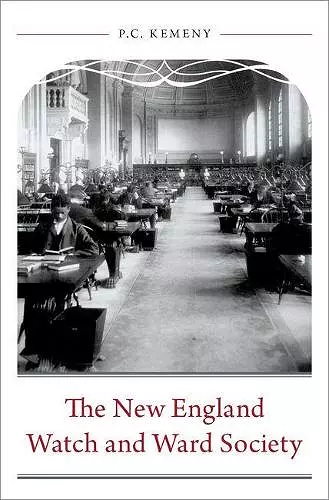The New England Watch and Ward Society
Format:Hardback
Publisher:Oxford University Press Inc
Published:1st Feb '18
Currently unavailable, and unfortunately no date known when it will be back

The New England Watch and Ward Society provides a new window into the history of the Protestant establishment's prominent role in late nineteenth-century public life and its confrontation with modernity, commercial culture, and cultural pluralism in early twentieth-century America. Elite liberal Protestants, typically considered progressive, urbane, and tolerant, established the Watch and Ward Society in 1878 to suppress literature they deemed obscene, notably including Walt Whitman's Leaves of Grass. These self-appointed custodians of Victorian culture enjoyed widespread support from many of New England's most renowned ministers, distinguished college presidents, respected social reformers, and wealthy philanthropists. In the 1880s, the Watch and Ward Society expanded its efforts to regulate public morality by attacking gambling and prostitution. The society not only expressed late nineteenth-century Victorian American values about what constituted "good literature," sexual morality, and public duty, it also embodied Protestants' efforts to promote these values in an increasingly intellectually and culturally diverse society. By 1930, the Watch and Ward Society had suffered a very public fall from grace. Following controversies over the suppression of H.L. Mencken's American Mercury as well as popular novels such as Sinclair Lewis' Elmer Gantry and D.H. Lawrence's Lady Chatterley's Lover, cultural modernists, civil libertarians, and publishers attacked the moral reform movement, ridiculing its leaders' privileged backgrounds, social idealism, and religious commitments. Their critique reshaped the dynamics of Protestant moral reform activity as well as public discourse in subsequent decades. For more than a generation, however, the Watch and Ward Society expressed mainline Protestant attitudes toward literature, gambling, and sexuality.
P.C. Kemeny's The New England Watch and Ward Society [is] a book that will stand as the definitive history of the moral reform organization. * Brian Donovan, University of Kansas, The New England Quarterly *
Kemeny's book is an impeccably researched contribution to studies of late 19th- and early 20th-century Protestant moral politics, making connections to broader American trends and reforms to create a comprehensive picture of virtue and vice in a tumultuous period of religious history. * Emily J. Bailey, Reading Religion *
this is still a most valuable addition to the corpus alike on modernist Protestantism, the Progressive era and the long history of the regulation of morality in the United States. * Markku Ruotsila, Journal of Ecclesiastical History *
Before there was a 'moral majority,' there was a moral aristocracy that included liberal Protestants, educated elites, and Progressive reformers who campaigned to protect social purity. Paul Kemeny provides an impressive history that offers a revealing window into a sometimes neglected dimension of mainstream American culture of only about a century ago. * George Marsden, author of Fundamentalism and American Culture *
Attempts to dictate public morality are usually associated with the Puritans and later fundamentalists. But as Paul Kemeny shows, it was theological liberals who were among the most zealous crusaders against 'vice' in the late nineteenth and early twentieth centuries. His fine book is not only an indispensable contribution to our understanding of liberal Protestantism but also a cautionary tale about the perils of coercive tactics for achieving cultural consensus. * Peter J. Thuesen, author of Predestination: The American Career of a Contentious Doctrine *
Paul Kemeny's history of the Watch and Ward Society is a rare achievement, a deep blend of social and urban history, theological ideas, and cultural theory. It is an entertaining and intellectually rich parable of secularization, a thick portrayal of the inner mechanisms of cultural change. * Margaret Bendroth, author of Fundamentalists in the City: Controversy and Division in Bostons Churches, 1885-1950 *
ISBN: 9780190844394
Dimensions: 160mm x 239mm x 36mm
Weight: 885g
410 pages